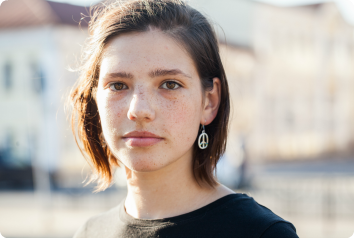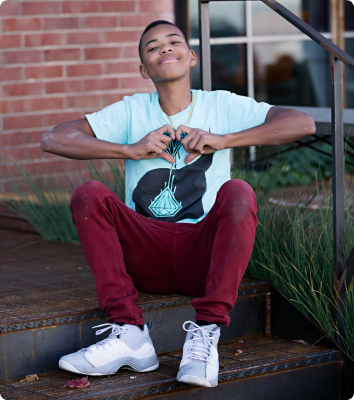 Every child deserves a safe and loving home, but for older kids in foster care, this basic need can sometimes be overlooked. As youth reach young adulthood, there is a misconception that they no longer “need” a family. However, that is far from the truth. Every child, whether 18-months-old or 18-years-old, needs love, guidance, and support.
Every child deserves a safe and loving home, but for older kids in foster care, this basic need can sometimes be overlooked. As youth reach young adulthood, there is a misconception that they no longer “need” a family. However, that is far from the truth. Every child, whether 18-months-old or 18-years-old, needs love, guidance, and support.
Transitioning into young adulthood is an important time in life, filled with many new experiences and challenges—like applying for college or a first job, learning how to drive, or navigating more complicated relationships. When teens age out of the foster care without the support that comes from an adoptive family or permanency connection, they are at a dramatically increased risk of developing a chemical dependency, criminal records, or an unplanned pregnancy (National Foster Youth Institute).
To learn more about how aging out of foster care impacts youth, we caught up with Heidi Wiste, CH/LSS Director of Social Work Foster Care & Adoption, and Amy Fogel, CH/LSS Domestic Adoption Supervisor.
What does “aging out” of foster care mean?
Heidi: To me, “aging out of foster care” means that a child is leaving the foster care system without a legal adoptive family. Youth may have identified permanency connections, but they are not legally related and therefore, can leave youth with a lot of uncertainty and instability. There are connections youth make with professionals, foster families, and friends while they are in foster care, which can lead to wonderful experiences and lifelong connections. While these can be encouraging, loving, reliable, and stable, they are not legal connections.
 Based on your experience, what do youth need to be prepared for a positive transition out of foster care?
Based on your experience, what do youth need to be prepared for a positive transition out of foster care?
Amy: Support, support, support. Although young people who are turning 18 often feel they want to be independent and do things on their own, it’s critical that they have support from others. There will be times when they need help with something and it’s important that they have people that they can call and reach out to.
When you’ve worked with youth who are aging out, are there any common fears or anxieties that you think are shared among the youth? How can we offer support?
Heidi: It is important for us, as a community, to make sure that we have provided youth—all youth—with the tools that will help them launch into adulthood. For youth not in foster care, issues like having clothes for an interview, practicing how to interview, creating a resume, balancing a checkbook, creating a budget, planning for taxes, are challenging enough. When you are without a home base and a trusting adult to guide you and help you move through these adulthood lessons, it can become incredibly difficult.
Some young adults may recognize what they don’t know and will ask questions, absorbing what is being shared with them to help them plan for their future. Others may relish in being offered a job but not know how to manage the responsibilities that come with this. A common need is for assistance with housing.
Is there anything you wish people knew about youth who are aging out?
Amy: I wish people knew that young people who are aging out still need supportive adults in their lives. They need people they can call when they are having a bad day or someone whose house they can go to if they need to do a load of laundry or have a home-cooked meal. There are some young people who age out of foster care and don’t have these people in their lives.
What advice would you give to prospective parents thinking about adopting a youth who is close to aging out?
Heidi: Children in foster care need you at any age. They need flexibility, understanding, compassion, and forgiveness. They need love, encouragement, and the tools to make good choices now, and better choices in the future. Prospective parents should focus on how to help youth move forward despite any setbacks they experience and provide them with the support they will need to live a healthy life.
 What can folks do to support kids in foster care, especially those who are close to aging out?
What can folks do to support kids in foster care, especially those who are close to aging out?
Amy: Explore foster care, adoption, respite, community programs that support families in need of a break, an extra hand, or someone to walk alongside them. There are amazing programs within our community that will help families assist youth in launching into adulthood, or for those children who are in foster care and in need of permanency.
Additional Resources:
Start your foster care journey through CH/LSS by attending a Foster Care & Adoption Orientation followed by the required Foster Care & Adoption Education Classes.
Statistics from the Minnesota Department of Human Services, April 2020.
Learn About Becoming a Foster Parent

